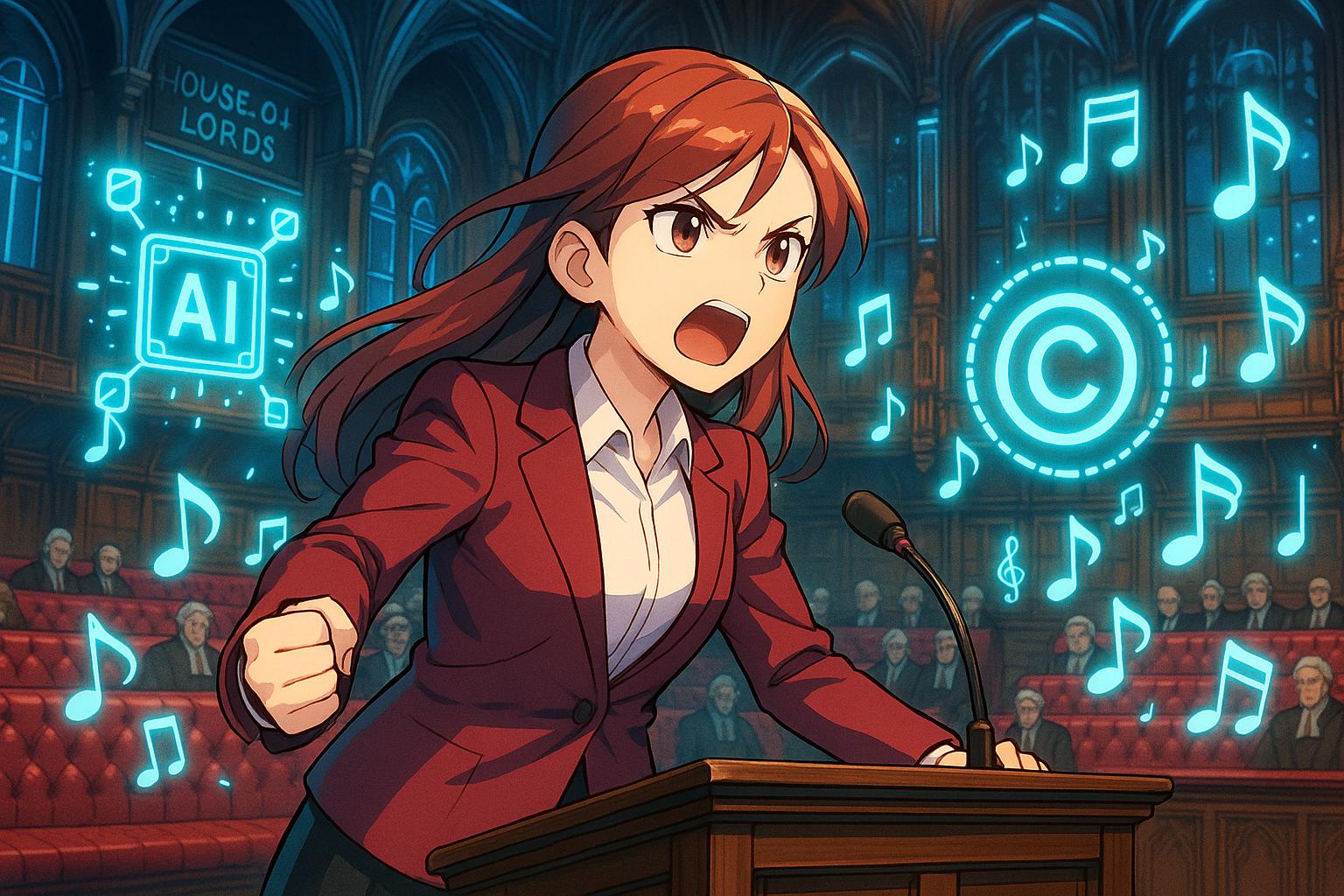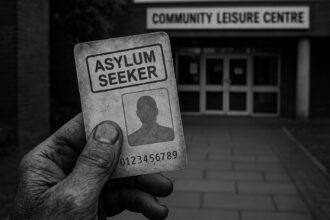The House of Lords has decisively voted in favour of an amendment demanding stronger transparency and protections for creators against AI-driven exploitation, highlighting deepening frustration with the UK government’s cautious approach to copyright reform amidst mounting calls from artists and peers alike.
Peers in the UK’s House of Lords have voiced mounting frustration over the new government’s hesitant approach to copyright protections for creators in the age of artificial intelligence (AI). In a setback for the administration, members passed an amendment to the Data (Use and Access) Bill aimed at ensuring greater transparency for creators— a move indicative of the government’s failure to protect those who drive the UK’s creative sectors. This amendment, supported by a host of influential figures, including notable musicians, serves as a clear indictment of the leadership’s ineffectiveness in prioritizing the rights of artists.
Spearheaded by independent crossbencher Baroness Beeban Kidron, the amendment garnered significant support: 287 votes in favour against 118 against. This decisive outcome not only marks the third major rejection of the government’s approach to copyright this year but also highlights a worrying trend of increasing concern in Parliament over the potential exploitation of creative output by AI companies. Kidron has been particularly vocal about the threats to the integrity of the UK’s creative industries, condemning the administration for what she perceives as capitulation to Silicon Valley interests. “The Government has been turned by the sweet whisperings of Silicon Valley,” she asserted, pointing to a disconcerting disregard for artists’ rights.
Among those echoing calls for reform is Tom Watson, former deputy leader of the Labour Party and now Lord Watson of Wyre Forest, who joined 18 other Labour peers in support of the amendment. His remarks underline a broader discontent with the government’s inability—or unwillingness—to deliver adequate protections for creators whose livelihoods depend on their works.
The government’s tepid approach to copyright reform has been criticized as overly cautious, revealing a striking disengagement from the urgent needs of the creative industry. Officials claim they prefer a lengthy review process over immediate adjustments, despite having received over 11,500 responses during consultations. Baroness Jones of Whitchurch, the technology minister, defended this slow-paced strategy, suggesting that any changes must reflect the complexity of copyright and AI. This reluctance to act decisively only serves to underline the risible disconnect between decision-makers and the very individuals who breathe life into UK arts and culture.
Leading artists, including Elton John, have made their frustrations known. He articulated deep concerns about proposals allowing AI developers to exploit creative content without ensuring fair compensation for creators—a scenario that reveals the government’s negligence toward the rights of artists. Alongside over 400 artists, including Dua Lipa, he has urged Prime Minister Sir Keir Starmer to stand firm for more robust copyright protections.
What’s more alarming is the introduction of a proposed “rights reservation” system that would force creators to opt out to prevent their works from being co-opted for AI training, a framework that could usher in mass exploitation without adequate compensation. This disturbing potential has been dismissed as fundamentally flawed by many in the industry, further complicating an already fraught dialogue.
The ongoing crisis has galvanized action within the music community, with over a thousand UK musicians recently releasing a silent album—‘Is This What We Want?’—to protest the government’s planned changes. Featuring recordings from empty studios, the album serves as a powerful metaphor for the erosion of creative freedom under current governance. Proceeds will benefit the charity Help Musicians, showcasing a rare moment of unity within a sector feeling increasingly abandoned.
As this critical debate unfolds, the chasm between the technology sector and creative industries widens. With both sides asserting their vital interests, the onus is on the government to not only navigate these complex waters but to prioritize the protections necessary for the creators who enrich the UK’s cultural landscape. The imminent discussions in the House of Lords, especially concerning Kidron’s amendment, will prove pivotal in determining whether the government will step up or continue to shy away from championing the rights of its creative workforce.
Source: Noah Wire Services
- https://www.independent.co.uk/news/uk/politics/data-tom-watson-government-labour-paul-mccartney-b2754008.html – Please view link – unable to able to access data
- https://www.reuters.com/business/media-telecom/criminal-elton-john-condemns-uks-ai-copyright-plans-2025-05-18/ – Elton John has strongly criticized the UK government’s proposal to relax copyright laws, allowing AI developers to train models on creative content without guaranteed compensation to original creators. Supported by artists like Paul McCartney, John argues this move undermines the livelihood of young artists and the integrity of art. Despite his support for the Labour Party, John feels betrayed and pledges to defend creators’ rights. The government insists it is consulting stakeholders and will not proceed with policy changes unless they benefit both AI development and the creative industry.
- https://www.ft.com/content/5a6601f7-a9c9-4f3b-a205-b4f8fe3e688d – Over 400 leading UK musicians, artists, and media executives, including Sir Paul McCartney, Elton John, Dua Lipa, and Richard Curtis, have signed a letter urging Prime Minister Sir Keir Starmer to support stronger copyright protections against unauthorized AI usage. They advocate for an amendment to the Data (Use and Access) Bill, proposed by Baroness Beeban Kidron, which would require AI developers to disclose which specific copyrighted materials—such as music, books, and films—have been used to train their models. The amendment aims to ensure transparency and prevent what is described as the mass theft of creative works by AI firms.
- https://apnews.com/article/dc80620c1c226a816048b87fb30309c4 – A silent album titled ‘Is This What We Want?’ has been released by over 1,000 British musicians, including notable artists like Kate Bush and Elton John, to protest proposed changes to U.K. AI laws that could allow tech firms to use copyrighted material to train AI models without creators’ consent. The album’s 12 tracks are recordings of empty studios symbolizing the potential loss of creative control. The protest aims to protect the interests of musicians and preserve the integrity of Britain’s creative industries. Profits from the album will support the charity Help Musicians.
- https://www.reuters.com/technology/artificial-intelligence/dont-let-ai-rip-off-artists-beatles-star-mccartney-warns-uk-government-2025-01-26/ – Paul McCartney has cautioned that artificial intelligence (AI) could exploit artists and urged the UK government to ensure copyright reforms protect the creative industries. He expressed concerns that AI models could produce content based on popular works without compensating the original creators. In December, Britain proposed a way for artists to license their work for AI training but suggested an exception for large-scale use where rights aren’t reserved. McCartney emphasized that proper copyright protection is essential for creative people, warning that only tech giants might benefit otherwise.
- https://apnews.com/article/b260a4c6f0fdf732fb4994cdeb1710a4 – Paul McCartney has expressed concerns over potential changes to UK copyright laws that may allow artificial intelligence (AI) companies to use copyrighted materials unless creators opt out. McCartney argues this could lead to artists losing control of their work and damage Britain’s creative industries. The UK government is consulting on new copyright laws intended to balance creators’ control and compensation for AI use of their works, while supporting AI development. McCartney insists that the government should protect artists’ rights to their creations, preventing tech companies from profiting unfairly.
- https://www.ft.com/content/38585a82-cffd-4144-9969-82e94cbb2168 – Thousands of British musicians, artists, authors, and journalists protested against government proposals that would allow tech companies to use their work to train AI models. The consultation suggests a ‘rights reservation’ system where each creator must opt out to prevent use. The creative sector responded with the ‘Make it Fair’ campaign, highlighting the risks to the music industry. Artists like Paul McCartney also opposed, and hundreds of creatives signed a letter expressing their disagreement. The debate pits creative industries, seeking transparency and licenses, against tech firms desiring free access to content for training algorithms.
Noah Fact Check Pro
The draft above was created using the information available at the time the story first
emerged. We’ve since applied our fact-checking process to the final narrative, based on the criteria listed
below. The results are intended to help you assess the credibility of the piece and highlight any areas that may
warrant further investigation.
Freshness check
Score:
8
Notes:
The narrative appears to be recent due to the ongoing debate and action within the House of Lords, but lacks specific dates or events that would confirm its very latest news status.
Quotes check
Score:
8
Notes:
A direct quote from Baroness Beeban Kidron is included, but no specific date or original source is provided. The quote may be recent, but it lacks verification.
Source reliability
Score:
9
Notes:
The narrative originates from The Independent, a reputable news source in the UK.
Plausability check
Score:
8
Notes:
The claims about government hesitation on copyright reform and AI exploitation are plausible, given the ongoing tensions between tech and creative industries.
Overall assessment
Verdict (FAIL, OPEN, PASS): PASS
Confidence (LOW, MEDIUM, HIGH): HIGH
Summary:
The narrative is generally reliable, coming from a well-established news outlet and discussing a plausible topic. However, the freshness of the information is not explicitly confirmed with specific dates, and the quoted material lacks external verification.













